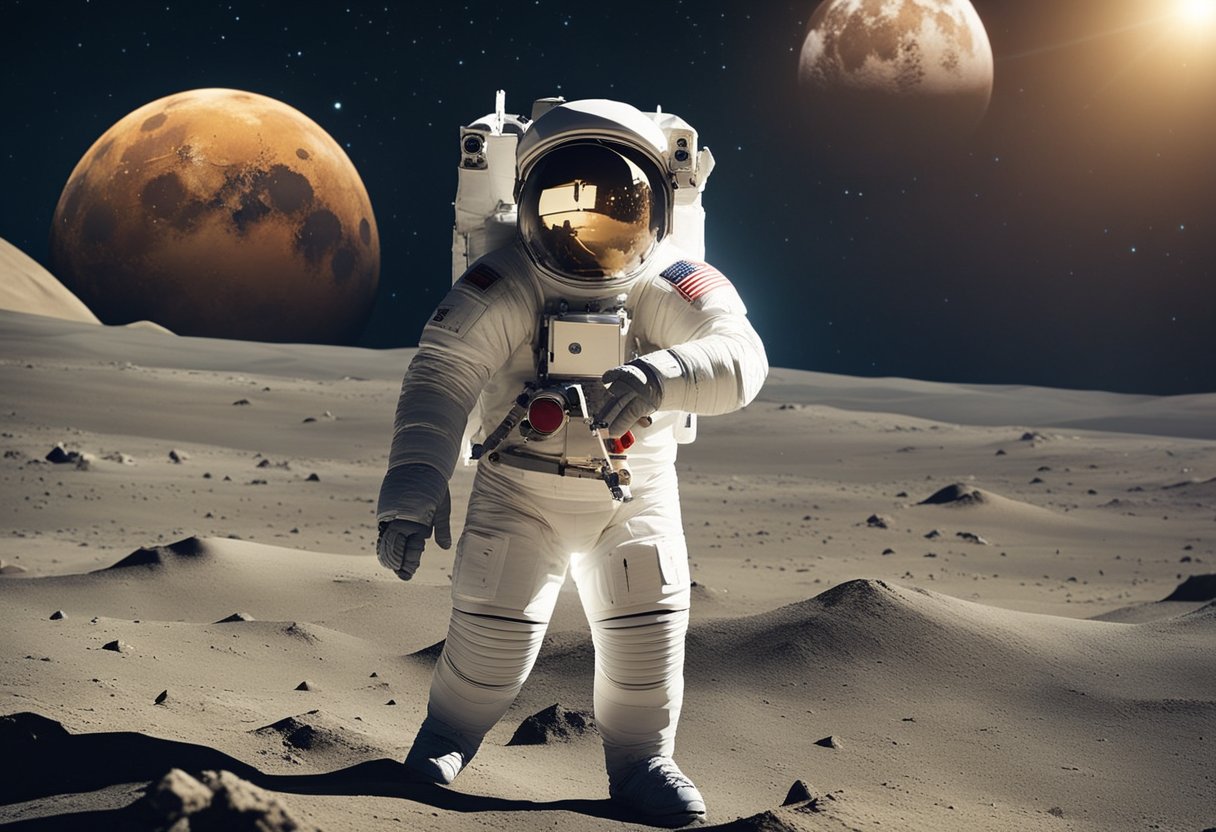
The Psychological Effects of Space Travel on Tourists: Space travel has long been the province of astronauts and cosmonauts, rigorously trained professionals prepared for the mental and physical toll of leaving Earth’s atmosphere. However, as space tourism becomes a burgeoning industry, the psychological effects of space travel on these new explorers have come into focus. The excitement of venturing into the cosmos is tempered by the reality that space is an environment unlike any other, challenging tourists with unique stressors and situations that might impact their mental health.
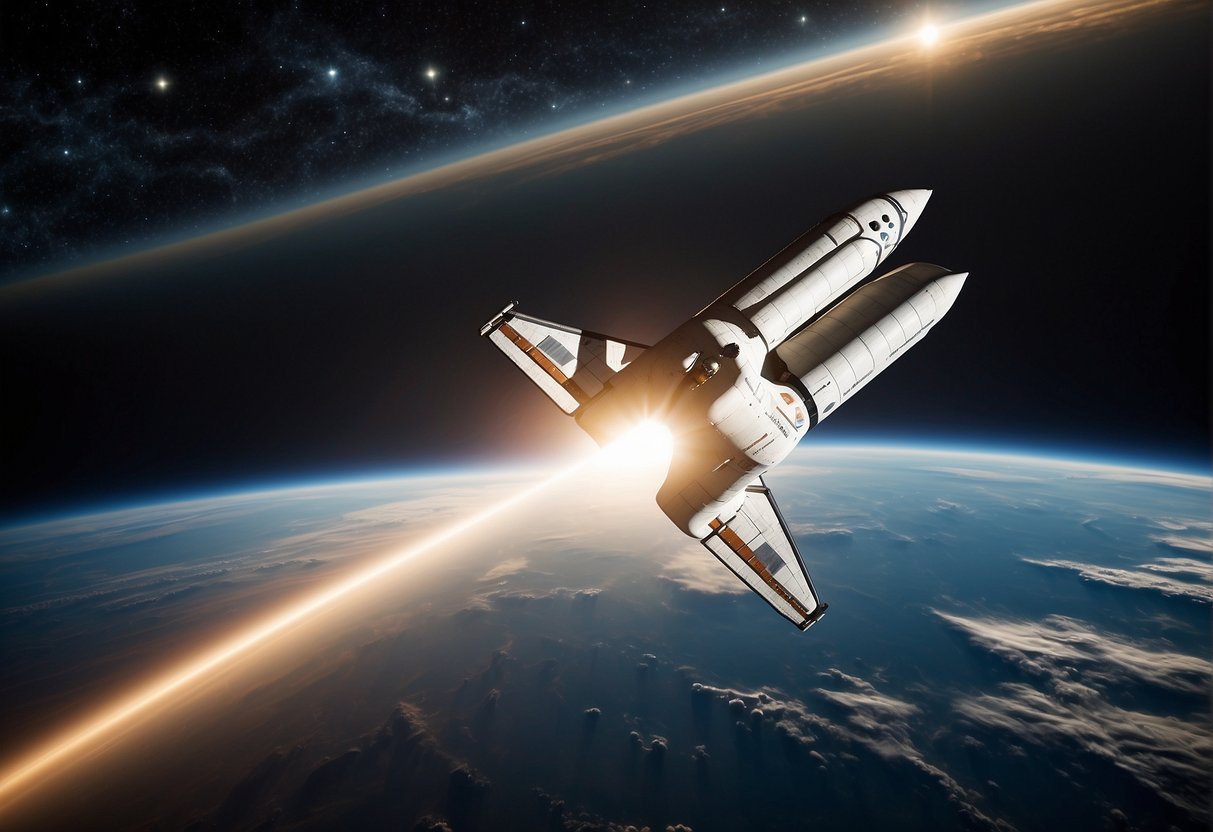
Understanding these effects is crucial for ensuring the safety and enjoyment of space tourists and for preparing them for the emotional and cognitive demands of space travel. Tourists must adapt to the unfamiliar conditions of microgravity, the confinement of a spacecraft, and the isolation from familiar earthly environments. These challenges are different in context from those faced by professional astronauts, as tourists may not have the same level of training to cope with these stressors.
Space travel presents a unique set of psychological and behavioral challenges that influence the well-being of tourists. These challenges stem from factors distinct to the space environment such as microgravity, confinement, and altered social dynamics.
Microgravity significantly affects physical and cognitive performance, which in turn impacts behavior. In the weightlessness of space, tourists must adapt to a new way in which their bodies move and function. They can experience spatial orientation issues and motion sickness, which can lead to feelings of discomfort or stress, affecting their mental health and emotional state.
The experience of confinement and social isolation on long-duration space missions can provoke a range of psychosocial reactions. Individuals may face feelings of loneliness, a sense of disconnection from Earth, and a change in their social dynamics. These aspects necessitate carefully considered countermeasures to ensure the mental well-being of space tourists, such as regular communication with Earth and structured schedules.
Communication delays and limitations can alter social interactions and dynamics among tourists in space. The crew must rely on effective team behavior and develop robust adaptation strategies to overcome the obstacles posed by limited private communication channels. A strong team dynamic is crucial for maintaining positive emotions and the overall psychological health of the group, mitigating the potential for negative feelings.

Tourists venturing into space will encounter unique environmental challenges. This section focuses on the specific health risks associated with space travel and practical countermeasures that can be implemented.
Space radiation presents significant risks, including potential damage to the immune system and increased carcinogenesis. Effective countermeasures involve shielding strategies and pharmaceutical interventions. For example, spacecraft can be equipped with materials that reduce radiation exposure, and tourists can take specific medications to protect against radiation-induced health effects.
Space motion sickness is a common issue for space tourists, characterized by nausea and disorientation. To mitigate these symptoms, pre-flight training and anti-nausea medication can be utilized. Gradual adaptation to the environment can also help tourists manage the discomfort associated with motion sickness.
The absence of natural light cues in space can result in sleep deprivation and circadian rhythm disturbances. Adopting a strict schedule that simulates a 24-hour day and using artificial lighting to mimic natural light can help maintain a healthy sleep cycle. Additionally, sleeping medications and behavioral strategies can ensure proper rest.
The vestibular system may be affected by microgravity, resulting in balance disorders. Furthermore, spaceflight-associated neuro-ocular syndrome (SANS) can lead to changes in intraocular pressure. Regular visual health assessments and in-space exercises aimed at vestibular adaptation can help counteract these challenges. Compression garments and resistance exercises are among the recommended countermeasures to address the influence of microgravity on the body.
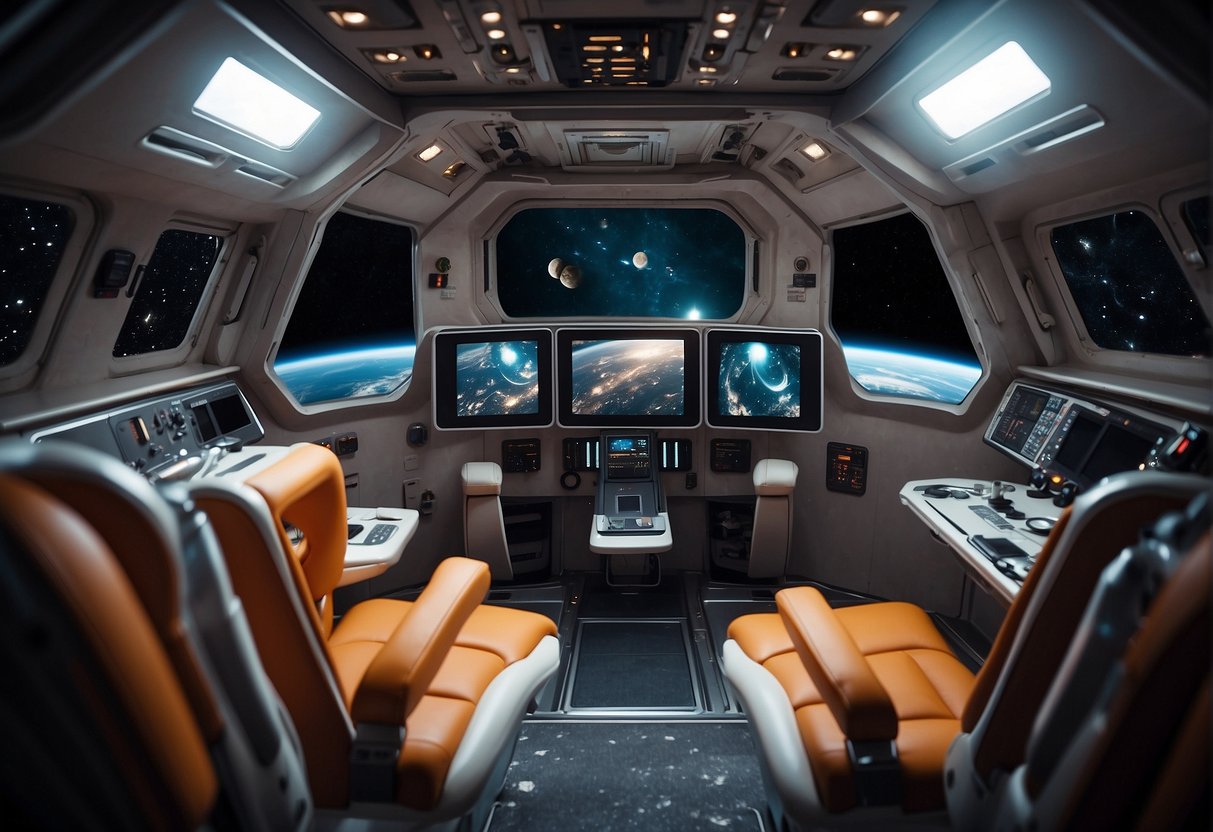
Before embarking on a journey beyond Earth’s atmosphere, space tourists must undergo comprehensive training and preparation. This essential phase ensures they are psychologically and physically equipped for the extraordinary experience ahead.
To meet the mental demands of space travel, tourists participate in psychological training tailored to reduce stress and manage in-flight challenges. They learn coping strategies for handling conflict and isolation, qualities explored within NASA’s Human Research Program. Scenario simulations, like those in NASA’s HERA (Human Exploration Research Analog), expose participants to scenarios they might encounter during suborbital flights to improve their stress responses and team dynamics.
Familiarizing passengers with their spacecraft environment is crucial for a successful transition to microgravity. Companies such as Virgin Galactic and Blue Origin offer mock-ups of spacecraft cabins, where tourists can experience mock launch sequences and acclimate to the compact living conditions. These sessions not only orient tourists to the spatial constraints but also help mitigate any disorientation and promote a stable circadian rhythm during their voyage.
The physical rigors of space travel necessitate that individuals maintain high fitness levels. Tourists engage in specialized exercises to bolster their tolerance to the unique strains of launch and re-entry forces. A regime might include cardiovascular and strength training, along with therapeutics to ensure adaptation to extreme environments. Each participant’s health and fitness are rigorously evaluated to confirm their readiness for the intense experience of commercial space travel.
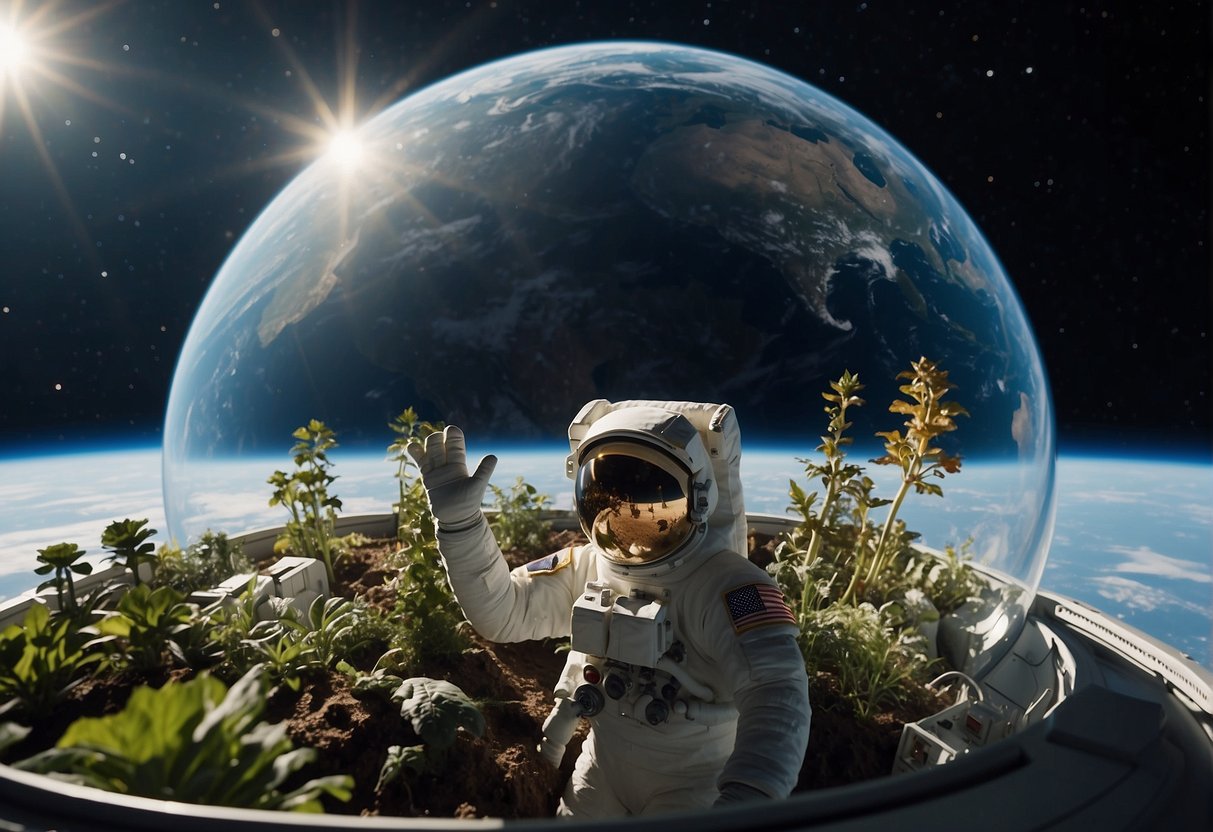
Life in space presents unique psychological and physiological challenges for tourists, necessitating a period of adjustment to the novel conditions of microgravity. This adaptation has both physical and mental dimensions that are crucial for maintaining performance and well-being during the journey.
In the microgravity environment of space, tourists must adjust to a sense of weightlessness. Movements that are intuitive on Earth require relearning, as common actions like walking or simply orienting oneself become redundant. This adaptation involves a cognitive shift in perception and body control, as tourists learn to navigate by pushing off surfaces and securing themselves to avoid drifting. Over time, individuals acclimate to these conditions, though the initial period can lead to a temporary decline in performance as the body adjusts to the absence of gravity.
Privacy in space is a significant psychological consideration, as space stations and spacecraft typically offer limited personal space. To mitigate feelings of claustrophobia and to maintain personal well-being, strategic communication amongst travelers is vital. Spaces are often designed with separate sleeping quarters and areas for solitude to aid in this adaptation. It’s essential that space tourists negotiate and respect these personal boundaries to preserve a sense of privacy, which in turn supports the overall mental health of the group.
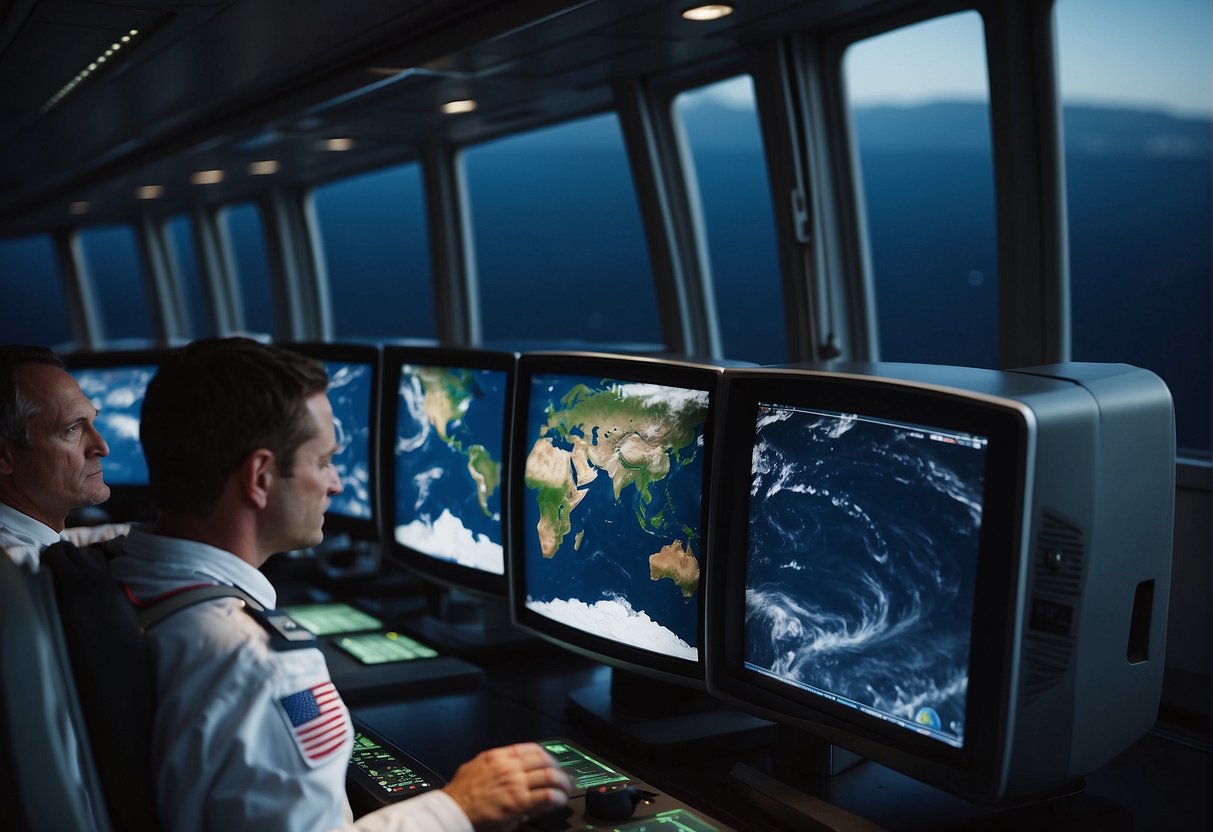
Space agencies like NASA and the European Space Agency (ESA) place significant emphasis on maintaining the mental and physical well-being of astronauts. Their rigorous attention to health and behavioral health is pivotal as missions, such as those aboard the International Space Station (ISS), extend the boundaries of human exploration and performance.
International collaboration is a cornerstone of astronaut well-being. Agencies invest in shared resources and research, such as the Human Research Program spearheaded by NASA, to understand the psychological challenges of space missions. Together with partners like ESA, they implement cross-cultural behavioral health strategies. This teamwork ensures consistent support for astronauts’ cognitive and psychological needs during their time on the ISS or in isolated environments like HERA – NASA’s analog for spaceflight.
To enhance astronauts’ well-being, space agencies have developed technological innovations and support systems. For instance, the Advanced Resilience Training provides tools to manage stress and promote mental health. Cutting-edge communication systems are vital, allowing consistent contact with loved ones and support back on Earth, which is essential for long-duration missions and isolation effects. Agencies also design supportive environments to optimize living and working conditions. These innovations reflect an understanding that reliable technology is essential not only for mission success but also for the holistic well-being of space travelers.
Long-duration space missions pose unique psychological challenges for tourists, from the profound separation from Earth to the intricate social dynamics among crew members. Understanding these impacts is critical as journeys extend beyond the confines of low Earth orbit towards destinations like Mars.
Humans have a profound connection to their home planet, both physically and emotionally. Prolonged separation from Earth can lead to a psychological phenomenon known as the Overview Effect, where astronauts experience a shift in perception about the planet and their place in the universe. This emotional response can enhance their appreciation for Earth’s fragility, profoundly affecting their well-being. Simulated missions like Mars500 have provided insights into managing isolation, revealing that the success of long-term expeditions relies not only on physical readiness but also emotional resilience.
The success of a mission can be contingent on the cultural and interpersonal dynamics aboard the spacecraft. Even with rigorous training, the confined conditions of space travel can amplify social tensions. Crew members’ understanding and judgment in navigating cultural differences and personal relationships are imperative. Strategies to maintain healthy interpersonal relationships are as vital to mission success as the technical specifications of the spacecraft.
A trip to Mars would be the longest and most isolated human spaceflight to date, lasting several months. The psychological factors at play include maintaining a sense of well-being in the face of isolation and the uncharted psychological territory of interplanetary travel. For Mars missions, astronauts will need to manage emotions and stress as they operate with a degree of autonomy never before required in human spaceflight. Preparing for this mentally involves extensive training to enhance cognitive skills and emotional stability, ensuring that their judgment and decision-making capabilities remain unimpaired throughout the journey.
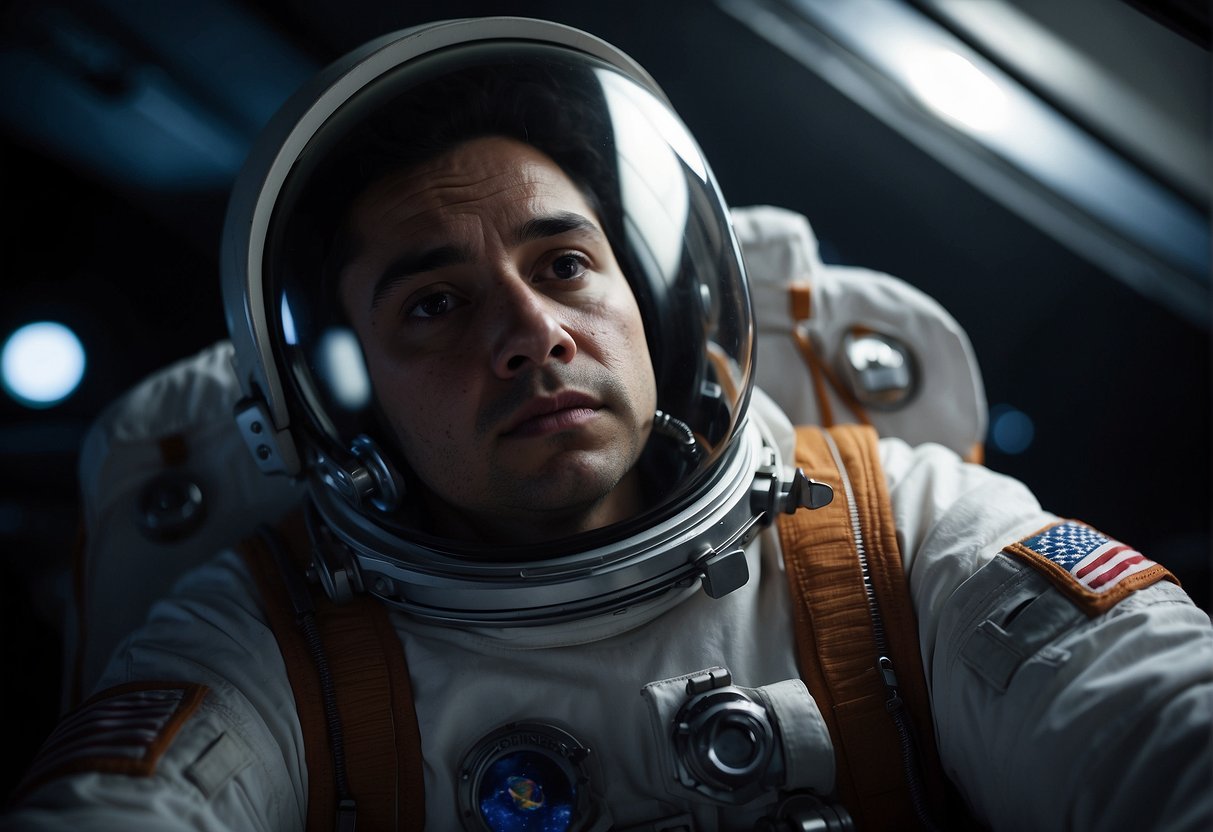
Returning from space travel, tourists experience profound psychological changes, including shifts in emotions and perceptions. The overview effect, a cognitive shift in awareness reported by astronauts, may influence their feelings and judgment about Earth and humanity.
Once space tourists return to Earth, they must readjust to the planet’s gravity and environment. This reacclimatization process involves physical and psychological adaptation. Physiologically, it includes regaining muscle strength and adjusting reflexes and reaction time. Psychologically, individuals may need to cope with changes in perception and emotions as they reintegrate into daily life. The journey’s memory can profoundly affect their long-term mental health and well-being.
For space tourists, long-term monitoring of health and psychology is crucial. It assesses the impact of space travel on neuroscience variables such as memory, vigilance, and executive functions. Continuous evaluation helps ensure that any subtle changes in cognitive functions or mental health are addressed promptly. Data suggest that the alterations in perception and judgment may persist, requiring ongoing support for the general public indulging in space travel.
Space tourism brings unique psychological challenges that are important for potential travelers to consider. This section addresses common inquiries about the mental health effects of space travel on tourists, the psychological support systems in place, and the preparations to mitigate stress during the journey.
The experience of space travel can have a significant impact on an individual’s mental health. Tourists may face emotional dysregulation and cognitive dysfunction due to the unfamiliar environment and the stress of spaceflight. Adapting to microgravity, managing isolation, and the intensity of the space experience can also contribute to anxiety and other psychological responses.
Companies involved in space tourism recognize the importance of psychological support and typically provide training and preparation for travelers. This could include familiarizing them with the spacecraft environment, offering coping strategies for stress, and having professional psychological support available before, during, and after the flight.
Considering the extreme conditions of space travel, tourists are indeed at risk of experiencing depression or anxiety. The significant changes in daily routines, sleep cycles, and the potential for social isolation can contribute to such mental health challenges.
Preparation for psychological stresses includes training sessions that simulate the space environment, providing orientation for what to expect, and, crucially, creating contingency plans for potential emergencies. Companies also work to build resilience and develop coping skills among space tourists to help them manage possible anxieties associated with space travel.
Research on the long-term psychological effects of space tourism is still emerging. However, tourists may experience lasting changes in perspective, such as the “overview effect”—a cognitive shift in awareness reported by some astronauts and space tourists upon viewing the Earth from space. The long-term emotional and behavioral consequences of this profound experience are still being studied.
Space tourists undergo a shorter and less rigorous training process when compared to trained astronauts, who spend years preparing for missions. Tourists also have more of a passenger role, with less responsibility for operating the spacecraft, which can affect their psychological stress levels differently than astronauts, who are focused on mission objectives and managing spacecraft systems.